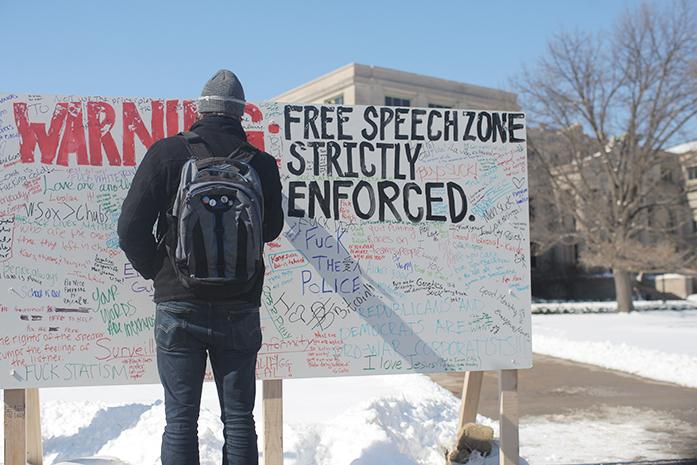By Jacob Senstad
Data show 40 percent of millennials are OK with the government limiting offensive speech, if it is directed at toward minorities.
Survey data were collected by the Pew Research Center from around the globe about free speech and media. The results, published in November 2015, showed that 4 out of 10 millennials were okay with the government limiting speech in certain cases.
With the Constitution’s First Amendment guaranteeing Americans the freedom of speech, some have concerns with regulations forbidding offensive speech.
University of Iowa senior Betsy Pearson, the chapter president for Young Americans for Liberty, is not in favor of limiting offensive speech.
“Honestly, it’s definitely hard to hear … I think a lot of people I go to school with, millennials in general, aren’t very informed about what losing the freedom of speech would mean to them,” she said. “A lot of people get caught up in ‘Oh, I don’t want to hear that, that hurts my feelings.’ I don’t think [millennials] understand the full repercussions that would happen if nobody had the right to free speech.”
UI sophomore Sandra Kromminga, who leans Democratic on most issues, said she would not be in favor of regulations forbidding offensive speech.
“I’m not surprised by the statistic, because millennials are often in support of everyone having their rights and making sure that minorities are respected and protected, such as immigrants and LGBTQ individuals,” she said. “I would think that the statistic might even be higher.”
UI junior Gavin Hanson, who identifies as libertarian, said he is against any limitations on the First Amendment.
“I think there is a big gap in the general public eye,” he said. “When you say, ‘Is hate speech protected by the First Amendment?’ I think [millennials] are really thinking of someone cursing out and threatening another person in such a way that makes the victim fear violence. That’s not hate speech, that’s assault.”
Kromminga said she does not see a ban on hate speech ever becoming a law.
“By many people’s standards, it would be unconstitutional and therefore would have a very difficult time getting support from Congress or a large majority of American people,” she said.
Pearson said she believes free speech is being impended on some college campuses across the nation.
“Obviously, I wouldn’t want this to happen,” she said. “I think that a real big place for bureaucrats and administrators to control things is at specific university campuses. Free speech on college campuses has been dwindling for years now. But they do have methods in place to curb a lot of [hate speech]. There is a huge debate if hate speech is free speech, but it has to all be included.”
The data did not specify the definition of “public speech” and whether that would include online speech, such as posts on social media.
“I think that obviously, there should be no laws against words or topics,” Hanson said. “A nation cannot battle its social demons with socially constructive laws. I don’t think they could enforce it. It’s ridiculous, but the worst part is that it gives [the government] probable cause to be in your computer. It makes me sick.”



